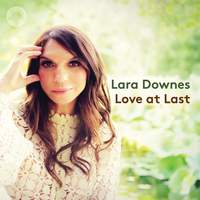Interview,
Lara Downes on Love at Last

Composers from a wide range of nations and cultures come together on an album that responds to the difficulties of recent years with a sense of stolid, unbending optimism. It's a selection that truly merits description as profoundly diverse - though as Lara explains, there's more to it than simply casting the net wide for repertoire.
This album seems to do many things at once – responding to the upheavals of our times, amplifying the voices of communities who rarely get a seat at the classical table, and celebrating a new generation of composers. Where did it all start, and how did it take shape in your mind?
What I love about this album is that while all those things you've mentioned are true, the intention was much more simple - just the story of the album. It wasn't until I was sitting with my editor finalising it and checking the tracklisting that I realised the incredible diversity that's on here. It wasn't the plan from the start. And what I love about that is that it tells me that this has become my musical language, which is the best thing that could ever happen. I've spent quite a lot of time and effort and energy investigating the diversity that can be possible in this art-form, and I think it really has become just instinctive now.
Really what I was looking for was music that expressed the overarching sentiment and message of this story, rather than the individual voices in themselves. I did want it to be a global story, so I was searching for representation of different cultures, but it wasn't about "making a diversity record" by any means.
In drawing together twenty-five short pieces (only one over five minutes long) from a wide variety of composers, you create a rather “playlist-y” atmosphere. Does this reflect your approach to music-making outside the studio as well?
It's two different media and two different structures. What I tend to do if I'm presenting music like this in a live format is I'll make little sub-sets, and again that's an opportunity for storytelling. I also like creating a soundworld where things that are very unexpected are heard side-by-side.
One piece that stands out is Sean Hickey’s work fluid - the Presto team couldn’t think of another example of a recording featuring a composition by the Managing Director of the record label! What’s the significance of this piece?
Sean and I have been friends for a long time - I actually knew him first as a composer. We've collaborated in that context in the past. And fluid was written for me during the pandemic. It has a special context to it that relates to both of our family lives, and it really belonged here. It was a really lucky opportunity.
How often does it happen that someone just writes a piece for you like that? Was fluid a formal commission, or something more casual?
On the album there's one piece that was technically a commission - Clarice Assad's A World of Change was written for me as part of a concert suite that was commissioned a few years ago. But the rest of these pieces were more like gifts that people gave me - requests by me, I suppose, but I wouldn't call them formal commissions.
That's something that's been very special in my life, and a bit transformative during these years of shutdown - my relationships with composers have changed. Across the board, all of the work has become something of personal importance. There was that whole period where whatever you were doing, it wasn't because someone else was asking you to do it - it was because you really felt that you wanted to do it. I wasn't preparing for concerts, I was playing because I wanted to play something. And it's been the same in my relationships with composers; the music that's being shared back and forth is really about responding to a moment, or just having a connection.
I remember it so well - my birthday is coming up this week - how I spent that in 2021, where I received two pieces of music from composer friends who were just thinking that this would be a nice thing that would help me, make me feel better.
Bound up with the whole idea of this record, with the times being dark right now, and they've been dark before, and we come in and out of tragedy as a human race... the other thing that's probably speaking to me is that, for instance, when Bach and Schubert wrote their music, they were also writing and creating out of very human and personal needs for self-expression.
You’ve been described as a “classical pianist and cultural activist” – for you, are those two separate facets, or are they rolled together into one?
It really is one thing, yes. I'm just not making music "to make music", if that makes sense; not in a vacuum. I have a whole list of mission-driven purposes for my music, and I don't know whether I would have got to this point in my life if I hadn't been doing the kind of work that I am, musically, in the kind of times that we're living in. For me, especially when it's come to my work in American music over the last seven years of craziness in this country, I've seen so immediately and directly and clearly that through this music and its history and the different voices that make it up and the songs and stories that it tells, I can help people. I can connect with a kind of continuum between people, and also with what's best about us rather than what's worst about us.
Lara Downes (piano)
Available Formats: CD, MP3, FLAC, Hi-Res FLAC



